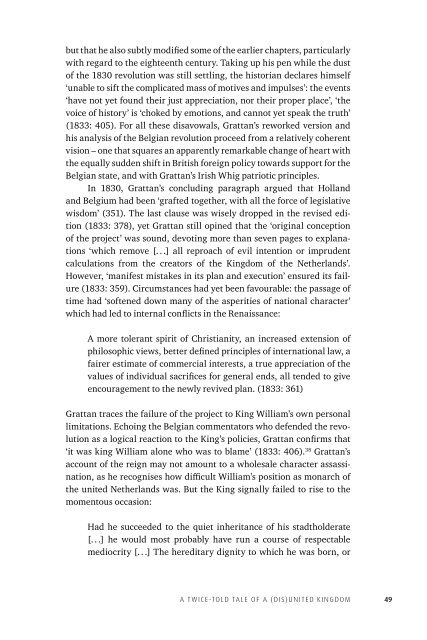Discord Consensus
7aze300jFJo
7aze300jFJo
Create successful ePaper yourself
Turn your PDF publications into a flip-book with our unique Google optimized e-Paper software.
ut that he also subtly modified some of the earlier chapters, particularly<br />
with regard to the eighteenth century. Taking up his pen while the dust<br />
of the 1830 revolution was still settling, the historian declares himself<br />
‘unable to sift the complicated mass of motives and impulses’: the events<br />
‘have not yet found their just appreciation, nor their proper place’, ‘the<br />
voice of history’ is ‘choked by emotions, and cannot yet speak the truth’<br />
(1833: 405). For all these disavowals, Grattan’s reworked version and<br />
his analysis of the Belgian revolution proceed from a relatively coherent<br />
vision –one that squares an apparently remarkable change of heart with<br />
the equally sudden shift in British foreign policy towards support for the<br />
Belgian state, and with Grattan’s Irish Whig patriotic principles.<br />
In 1830, Grattan’s concluding paragraph argued that Holland<br />
and Belgium had been ‘grafted together, with all the force of legislative<br />
wisdom’ (351). The last clause was wisely dropped in the revised edition<br />
(1833: 378), yet Grattan still opined that the ‘original conception<br />
of the project’ was sound, devoting more than seven pages to explanations<br />
‘which remove [. . .] all reproach of evil intention or imprudent<br />
calculations from the creators of the Kingdom of the Netherlands’.<br />
However, ‘manifest mistakes in its plan and execution’ ensured its failure<br />
(1833: 359). Circumstances had yet been favourable: the passage of<br />
time had ‘softened down many of the asperities of national character’<br />
which had led to internal conflicts in the Renaissance:<br />
A more tolerant spirit of Christianity, an increased extension of<br />
philosophic views, better defined principles of international law, a<br />
fairer estimate of commercial interests, a true appreciation of the<br />
values of individual sacrifices for general ends, all tended to give<br />
encouragement to the newly revived plan. (1833: 361)<br />
Grattan traces the failure of the project to King William’s own personal<br />
limitations. Echoing the Belgian commentators who defended the revolution<br />
as a logical reaction to the King’s policies, Grattan confirms that<br />
‘it was king William alone who was to blame’ (1833: 406). 38 Grattan’s<br />
account of the reign may not amount to a wholesale character assassination,<br />
as he recognises how difficult William’s position as monarch of<br />
the united Netherlands was. But the King signally failed to rise to the<br />
momentous occasion:<br />
Had he succeeded to the quiet inheritance of his stadtholderate<br />
[. . .] he would most probably have run a course of respectable<br />
mediocrity [. . .] The hereditary dignity to which he was born, or<br />
A twice-told tale of a (dis)united kingdom 49


